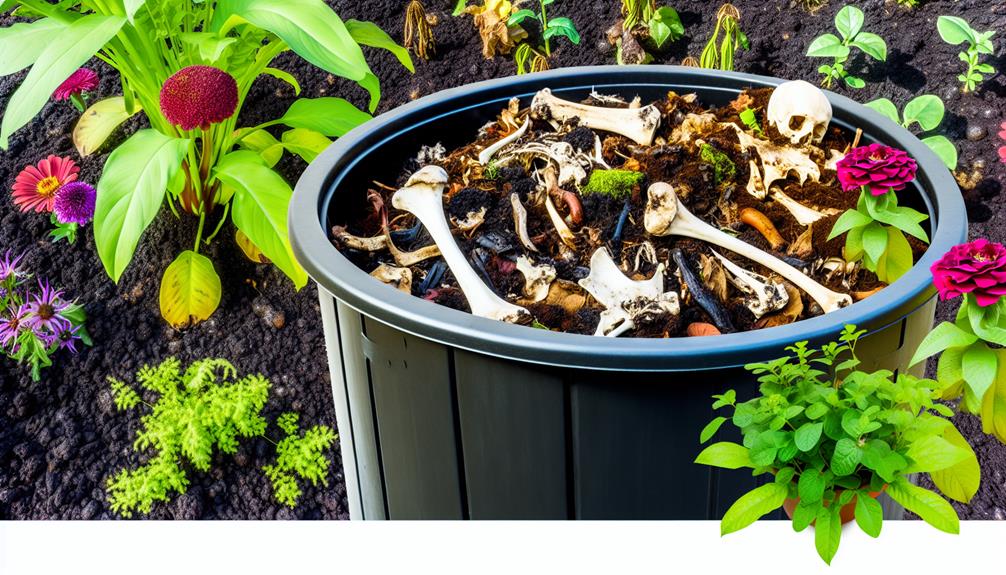

Yes, you can definitely compost bones! Composting bones not only reduces food waste but also enriches your soil with essential nutrients like calcium and phosphorus. To do it right, break the bones into smaller pieces and layer them with nitrogen-rich materials. Make sure to use hot composting methods to speed up decomposition and prevent attracting pests.
While bones take longer to break down, the effort is worth it for their incredible benefits. Bone composting also cuts down on the need for chemical fertilizers, promoting more sustainable gardening. Keep going to uncover detailed tips on preparing and composting bones effectively!
Bones are primarily composed of minerals like calcium and phosphorus, which play an essential role in their structure and strength. These minerals bond with collagen, a flexible protein that gives bones a bit of bend and resilience. You’ll find that bones aren’t just hard and lifeless; they’re living tissues that constantly renew themselves. This dynamic nature helps them support and protect your body’s organs while also enabling movement.
Being part of a community that values sustainability, understanding bone composition helps you grasp why bones can be a valuable resource. The minerals in bones don’t just disappear; they can be repurposed in various ways, making them an intriguing topic for those passionate about eco-friendly practices. This connection to natural cycles fosters a deeper sense of belonging.
Composting bones offers incredible benefits for your garden and the environment. You’ll enrich your soil with essential nutrients, cut down on food waste, and embrace sustainable gardening practices.
When you add bones to your compost, the soil benefits from a rich infusion of essential nutrients like calcium and phosphorus. These nutrients help plants grow stronger and healthier, enhancing root development and boosting overall plant vitality. Bones break down slowly, releasing nutrients over time, which creates a continuous supply for your garden.
Incorporating bones into your compost fosters a balanced ecosystem, promoting microbial activity essential for soil health. This long-lasting nutrient source supports a thriving garden community, making you feel more connected to your gardening efforts.
Turning bones into compost not only enriches your garden but also greatly reduces food waste. By composting bones, you’re taking a proactive step to minimize the amount of waste that ends up in landfills.
This practice has several benefits:
Utilizing bone composting in your garden not only enhances soil fertility but also promotes sustainable gardening practices.
When you compost bones, you’re enriching your soil with essential nutrients like calcium and phosphorus, important for plant growth. This practice reduces waste and transforms what would be landfill material into a valuable resource.
By doing this, you join a community of eco-conscious gardeners dedicated to sustainability. Plus, bone composting minimizes the need for chemical fertilizers, making your garden healthier and more organic.
You’re also reducing your carbon footprint by recycling kitchen scraps. Embracing this method fosters a deeper connection with nature and community, as you contribute to a greener planet, one bone at a time.
Also Read: Can You Compost Bag?
Composting bones poses several unique challenges that gardeners must tackle to guarantee successful decomposition. Bones decompose much slower than other organic materials, requiring more patience and effort.

Here are three main challenges you’ll face:
Understanding these challenges helps you feel more connected to the gardening community, sharing common hurdles and solutions.
To prepare bones for composting, you’ll need to start by thoroughly cleaning them to remove any remaining meat and fat. Next, break the bones into smaller pieces to speed up the decomposition process.
Before you can compost bones, you need to clean them thoroughly to remove any remaining meat and fat. Making sure bones are clean is important for efficient composting and to prevent attracting pests.
Here’s how you can do it:
Now that your bones are clean and dry, it’s time to break them into smaller pieces to speed up the composting process. Using a sturdy hammer or a heavy-duty grinder, carefully crush the bones into manageable fragments. This step is essential because smaller pieces decompose faster, integrating more seamlessly into your compost.
You could even consider wearing safety goggles and gloves for added protection. Gather your family or friends to help; it’s a fantastic way to bond over sustainability efforts. By breaking down the bones, you’re ensuring that your compost remains efficient and nutrient-rich, providing your garden with the best possible nourishment.
Begin by soaking the bone fragments in a mixture of water and vinegar to soften them and accelerate the composting process. This step is essential because it helps to break down the bones more quickly, making your compost richer and more effective.
After soaking, follow these steps:
Also Read: Can You Compost Arugula?
To effectively compost bones, you’ll need to follow specific methods that guarantee they break down properly and add valuable nutrients to your compost. First, grind the bones into smaller pieces to speed up decomposition. Next, layer the bone fragments with nitrogen-rich materials like kitchen scraps for a balanced compost mix.
Using a hot composting method will generate the high temperatures needed to break down the bones faster. Regularly turn the compost to maintain aeration and distribute heat evenly. Finally, be patient and monitor the progress to make sure the bones are decomposing as expected.
| Method | Description | Benefit |
|---|---|---|
| Grinding | Break bones into smaller pieces | Speeds up decomposition |
| Layering | Mix with nitrogen-rich materials | Balances compost mix |
| Hot Composting | Maintain high temperatures | Faster breakdown of bones |
| Turning | Regularly aerate the compost | Even heat distribution |
| Monitoring | Check progress consistently | Verifies thorough decomposition |
These steps will help integrate bones effectively into your compost, enriching your garden soil.
Understanding how long it takes for bones to decompose in your compost is key to achieving the best results. Bones are tougher to break down than other organic materials, but with patience and the right conditions, they can become valuable compost.
Here’s a general timeline for bone decomposition:
To speed up the process, you can use a hammer to break the bones into smaller pieces, ensuring they decompose faster.
Incorporating bone meal into your compost can greatly enhance its nutrient content, providing essential minerals for plant growth. Bone meal is rich in phosphorus and calcium, which are vital for strong roots and vibrant blooms.
When you add bone meal to your compost, you’re creating a balanced, nutrient-dense environment that plants love. It helps improve soil structure, making it easier for roots to grow and absorb nutrients.
To use bone meal, simply mix it into your compost pile or garden beds. Make sure to blend it well, so it evenly distributes throughout the compost.
This practice not only nurtures your plants but fosters a sense of community with nature, connecting you deeply with the earth and its cycles.
While incorporating bone meal into your compost is beneficial, there are also several other innovative ways to utilize bones in your gardening and household practices.
By rethinking how you use bones, you can transform waste into valuable resources, fostering a deeper connection with sustainable living.
Here are three creative ways to repurpose bones:
Embrace these practices, and you’ll contribute to a more sustainable and resourceful community.
Also Read: Can You Compost Acorns?
When composting bones, it’s essential to avoid common mistakes that can hinder the process and reduce the quality of your compost. Firstly, don’t add large bones directly; they decompose slowly, delaying composting. Instead, crush or grind them to speed up the breakdown. Secondly, avoid composting bones with fatty tissue, as it attracts pests and causes foul odors.

Thirdly, don’t neglect to balance your compost pile. Bones are high in calcium but low in nitrogen, so mix them with green waste to maintain nutrient balance. Lastly, don’t leave bones uncovered; always bury them in the compost pile to prevent scavengers.
| Mistake | Solution |
|---|---|
| Adding large bones | Crush or grind them |
| Including fatty tissue | Remove fat before composting |
| Improper nutrient mix | Add green waste |
| Leaving bones exposed | Bury in compost pile |
Composting bones isn’t just possible, it’s incredibly beneficial for your garden. By understanding bone composition, preparing them properly, and using effective composting methods, you can turn bones into valuable nutrients.
Remember, patience is key—decomposition takes time. Once broken down, bone meal enriches your soil, promoting healthier plants.
Avoid common mistakes, like adding large bones without preparation. With these tips, you’ll transform bones into a powerhouse for your compost, boosting your garden’s health and productivity!
